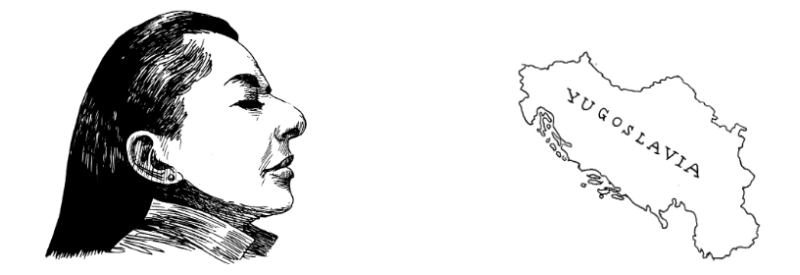For six hours a day over four consecutive days, in a dank basement in the heat of the summer, Marina Abramovic sat atop a massive pile of raw cow bones, laboriously scrubbing each one clean with a brush and a bucket of soapy water. Projected images of her parents framed her, reflected in copper bowls of water below, and a video showed the artist explaining how trapped rats will kill one another in order to survive. As Abramovic scrubbed, she sang Yugoslav folk tunes, and her white smock became soiled with dirt, blood, and flesh.
Performed at the 1997 Venice Biennale, Balkan Baroque won its top award, the Golden Lion. A public ritual, an act of mourning for the Balkan conflicts of the 1990s, it was a visceral and grotesque affair: the overwhelming stench of the maggot-infested bones that increased over the course of the performance, the enormous presence of death and the need to grieve, and the absence of the violence to which the mass grave referred. In making no specific political statements, no attacks on nor claims to identity, the piece contained aspects of both victim and perpetrator, with no firm boundary between the two.
Abramovic is widely regarded as the godmother of performance art, and her reputation is towering.
Since the 1970s, she has been making work that deals with ceremony, spirituality, discipline, trust, witnessing, and the limits of the human body. She is also a woman of my mother’s generation who speaks the idiosyncratic dialect of the immigrant community I grew up in.
Abramovic emigrated from the Socialist Federal Republic of Yugoslavia (SFRY) in 1976—first to Amsterdam and later to New York. Despite her purposeful distancing from her homeland, her roots are consistently expressed in both her work ethic and subject matter. Balkan culture rests on a bedrock of sacrifice, stoicism, and struggle that predates the socialist era, and it was upon this bedrock that Josip Broz Tito and his Partisans engineered an astounding underdog resistance in defeating the Axis occupation to establish the SFRY, in 1945. A year later, Abramovic was born to two national heroes of Montenegrin origin who fought alongside Tito.
Five decades later, Balkan Baroque was performed during a time of precarious peace in the region: it hadn’t yet been two calendar years since the December 1995 signing of the Dayton Accords, which officially ended the war in Bosnia, one chapter of the Yugoslav Wars. However, violence broke out once more, in 1998, in Kosovo. Two decades after these events, it still feels too soon to talk about reckoning and reconciliation.
Balkan Baroque was a macabre homecoming: Abramovic had not made work directly related to...
You have reached your article limit
Sign up for a digital subscription and continue reading all new issues, plus our entire archives, for just $1.50/month.
Already a subscriber? Sign in





